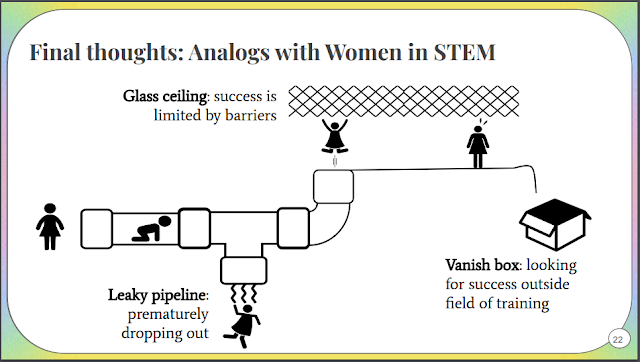It finally happened. I delivered a presentation in Japanese in front of a lot of people... 83 of them. Every year, Tokyo Tech's Center for Innovative Teaching and Learning (CITL) conducts a symposium. This year's theme is on supporting doctoral students to be pillars of future society; that is, providing training to doctoral students that can help them become better academics and professionals. Having started my new position as an Educational Specialist at CITL's Online Content Research and Development (OCRD) and having completed the Graduate Student Assistant - Developer (GSA-D) program when I was a doctoral student, I was requested to present my experiences with Professor Cross' lecture which is about GSA-D. I took this opportunity to speak out about my advocacies as well.
 |
| Favorite slide? |
GSA is a Tokyo Tech program where learning communities are formed to allow students to learn additional academic skills that they might not be able to build within their regular study and research activities. It is composed of three certifications under GSA: Facilitator, Reviewer, and Developer. The Developer certification involves participating in online course development by OCRD. In my presentation, I talked about how I imagine the future will be based on aspirations for better working conditions (
future of work), our changing ways of relating with each other with respect to time and space, as well as lifelong learning.
The premise of this symposium, as I see it, is that people are not taking an interest in doctoral studies anymore as it does not seem to contribute to the individual's better future. Because doctoral students eventually become academics and highly skilled professionals in the future, having fewer doctoral students is problematic. Hence, there is a need for programs to attract students to pursue doctoral studies.
That may be true, but it is eerily reminiscent of the women in STEM problem. We recognize that women's participation in STEM fields is important for progress, thus the proliferation of several programs encouraging women to pursue STEM careers. These programs fail to recognize though that there are a lot more challenges that women face once they start their STEM careers. Some of them may find that they do not have upward career mobility and some eventually choose to leave their STEM career. I feel that this is very similar to the doctoral student problem. After graduation, they are faced with a scarcity of decent jobs, leading them to pursue alternative academic careers they could have started earlier with a bachelor's or master's degree. I think encouraging students to pursue doctoral studies without improving the academic and research working conditions first is doing a disservice to the students that they want to be the pillars of future society.
For a copy of relevant materials (e.g., presentation, paper) or any questions you may have, please feel free to reach out to me through the Contact Me gadget on this blog's sidebar.
Details
Title: Tokyo Tech’s Graduate Student Assistant (GSA) Developer Program
Presenters: Jeffrey S. Cross and May Kristine Jonson Carlon.
Date: January 26, 2023

Comments
Post a Comment